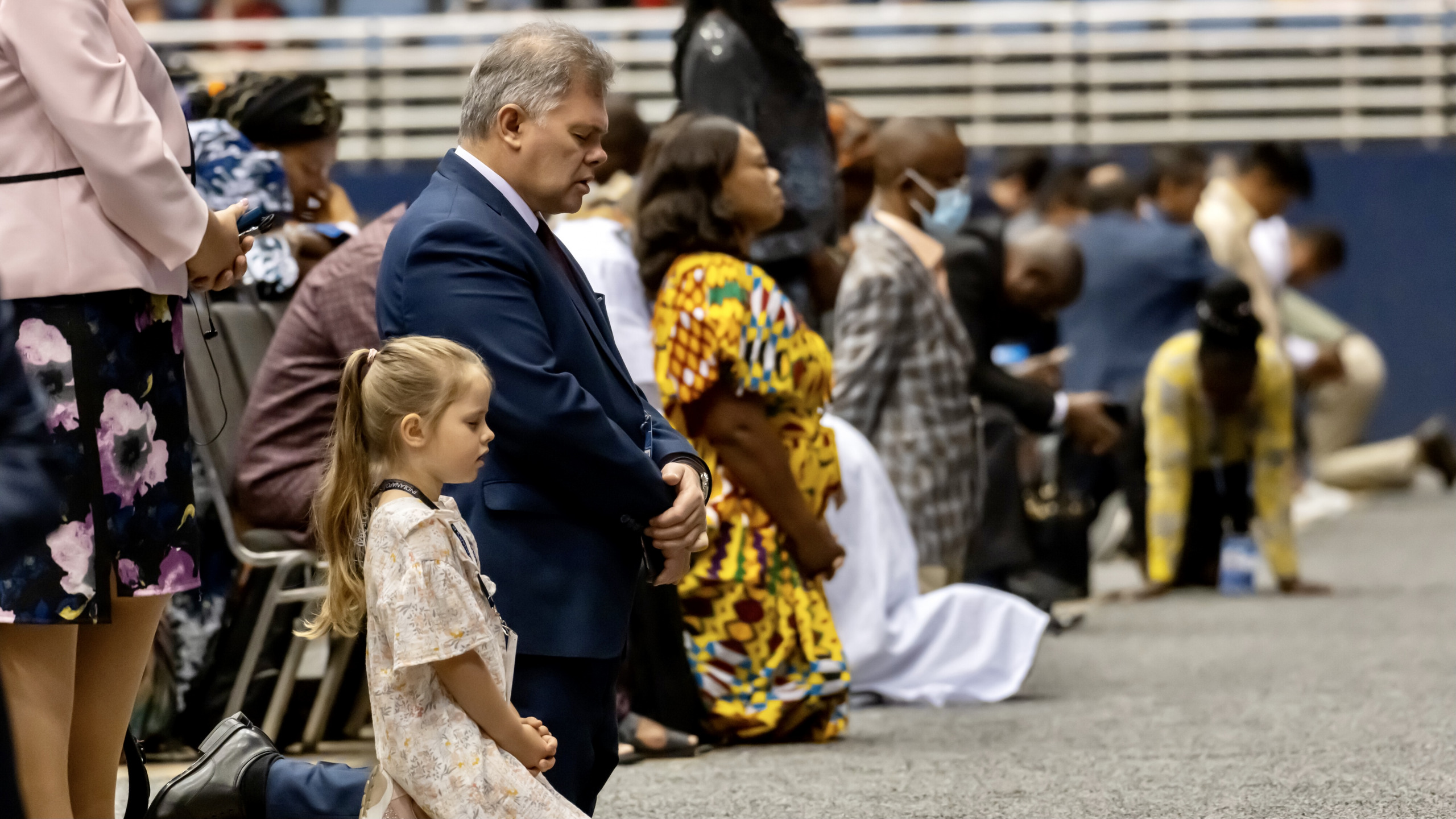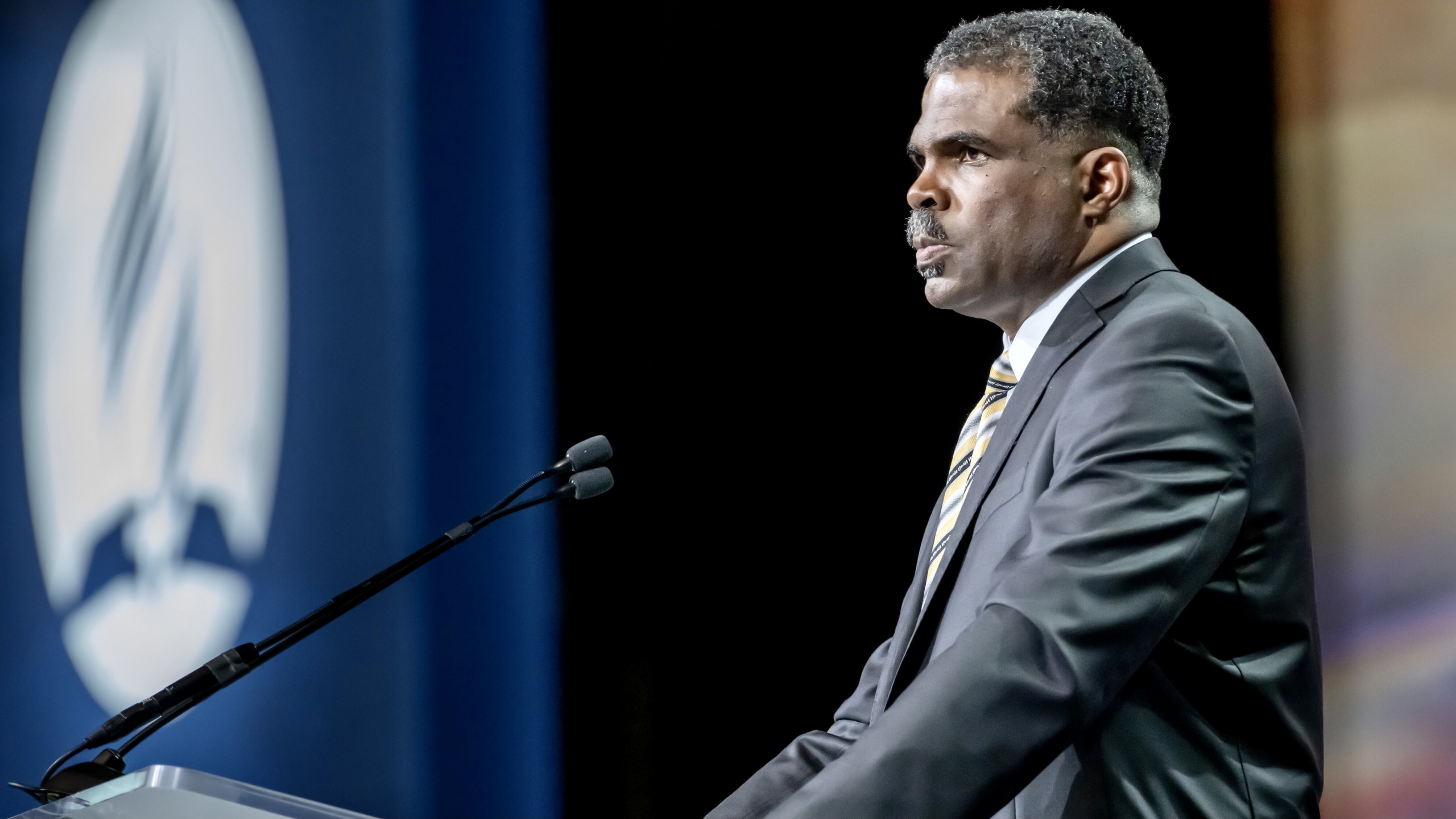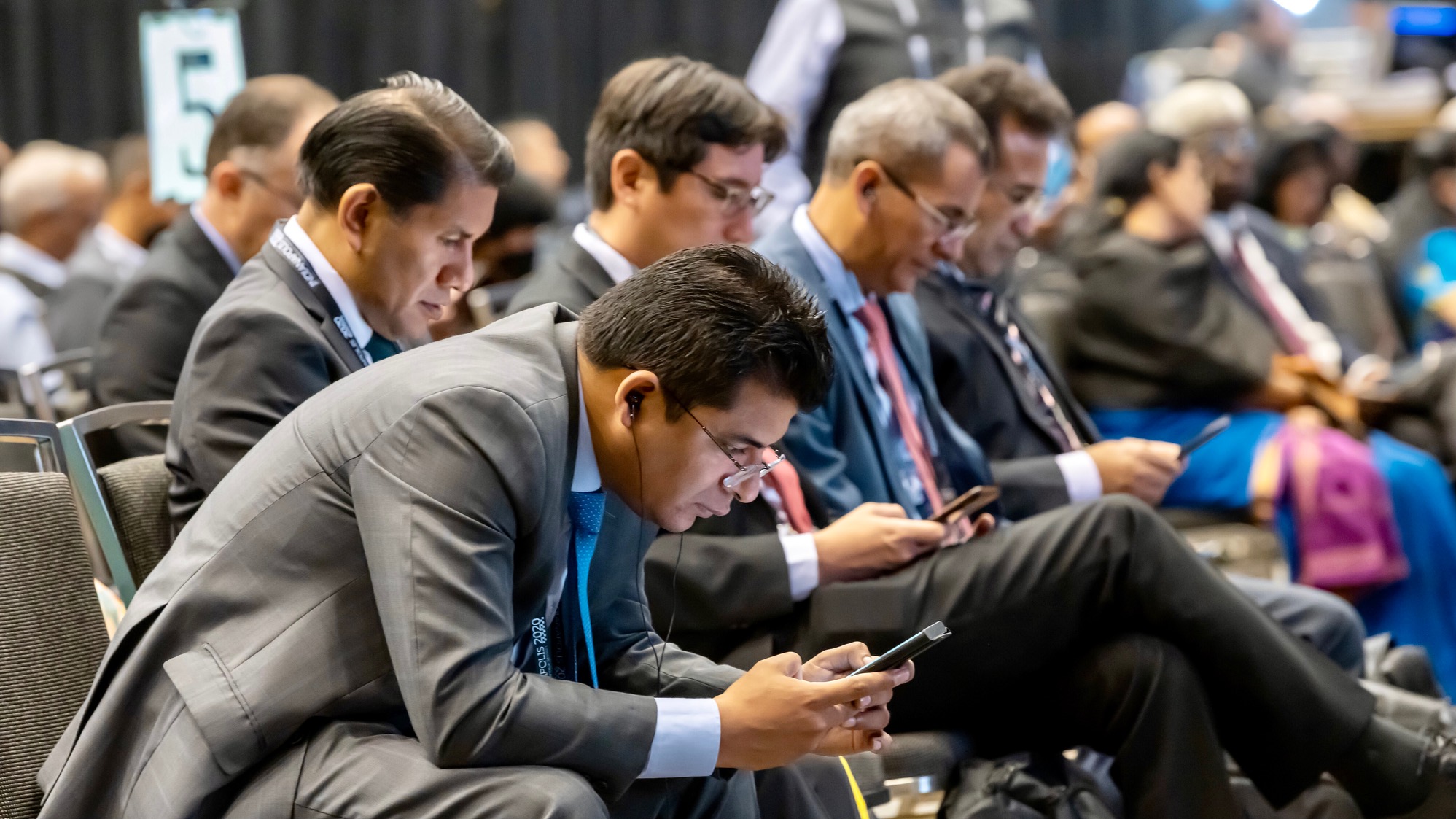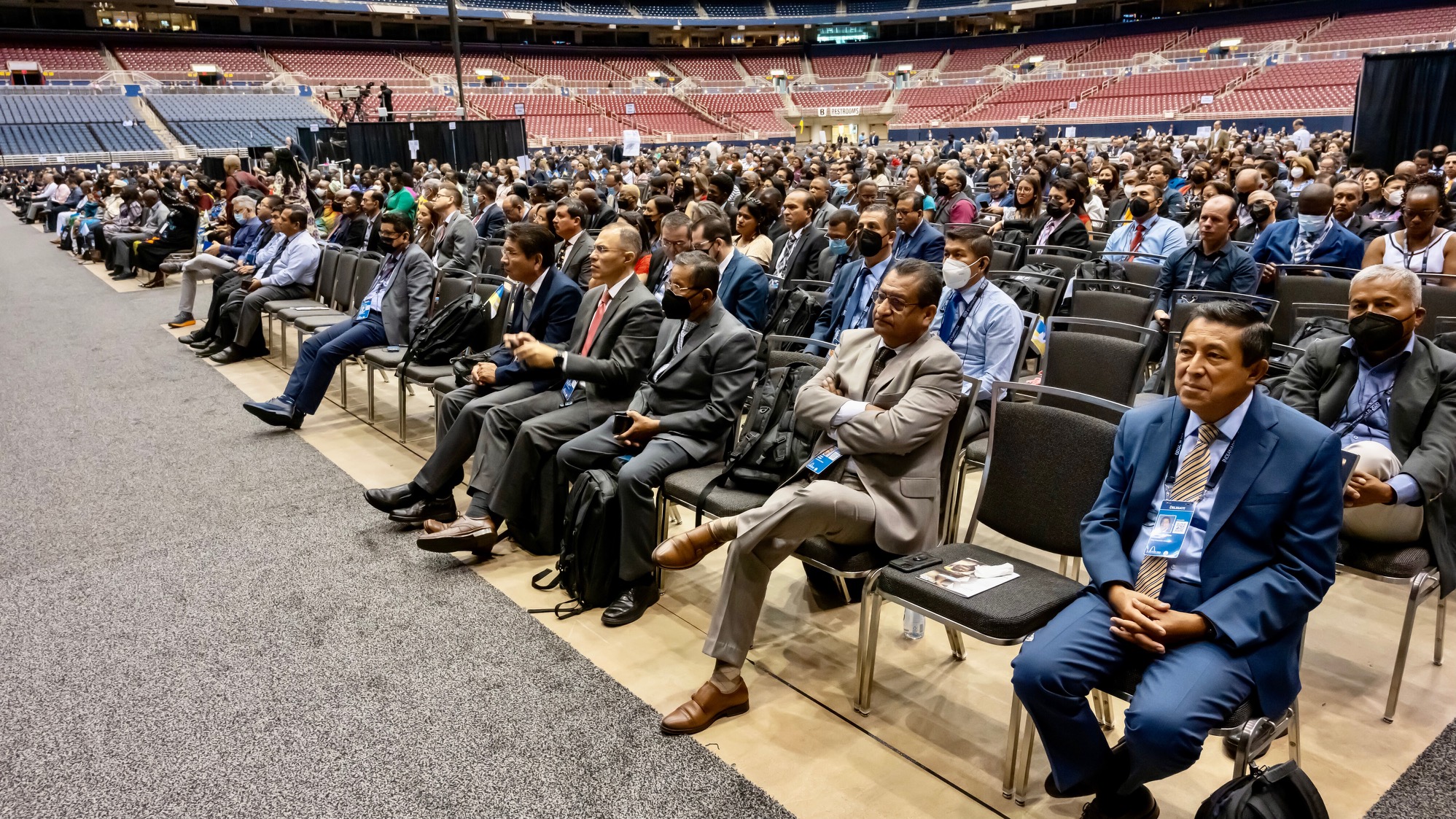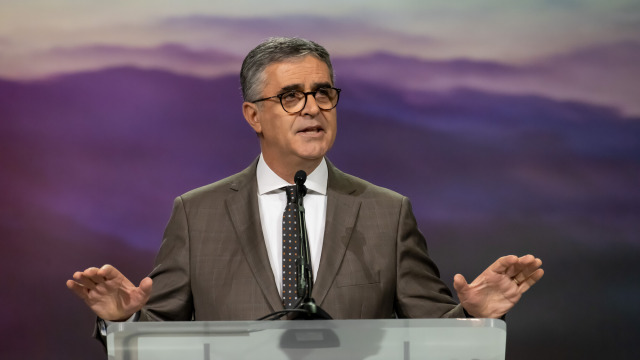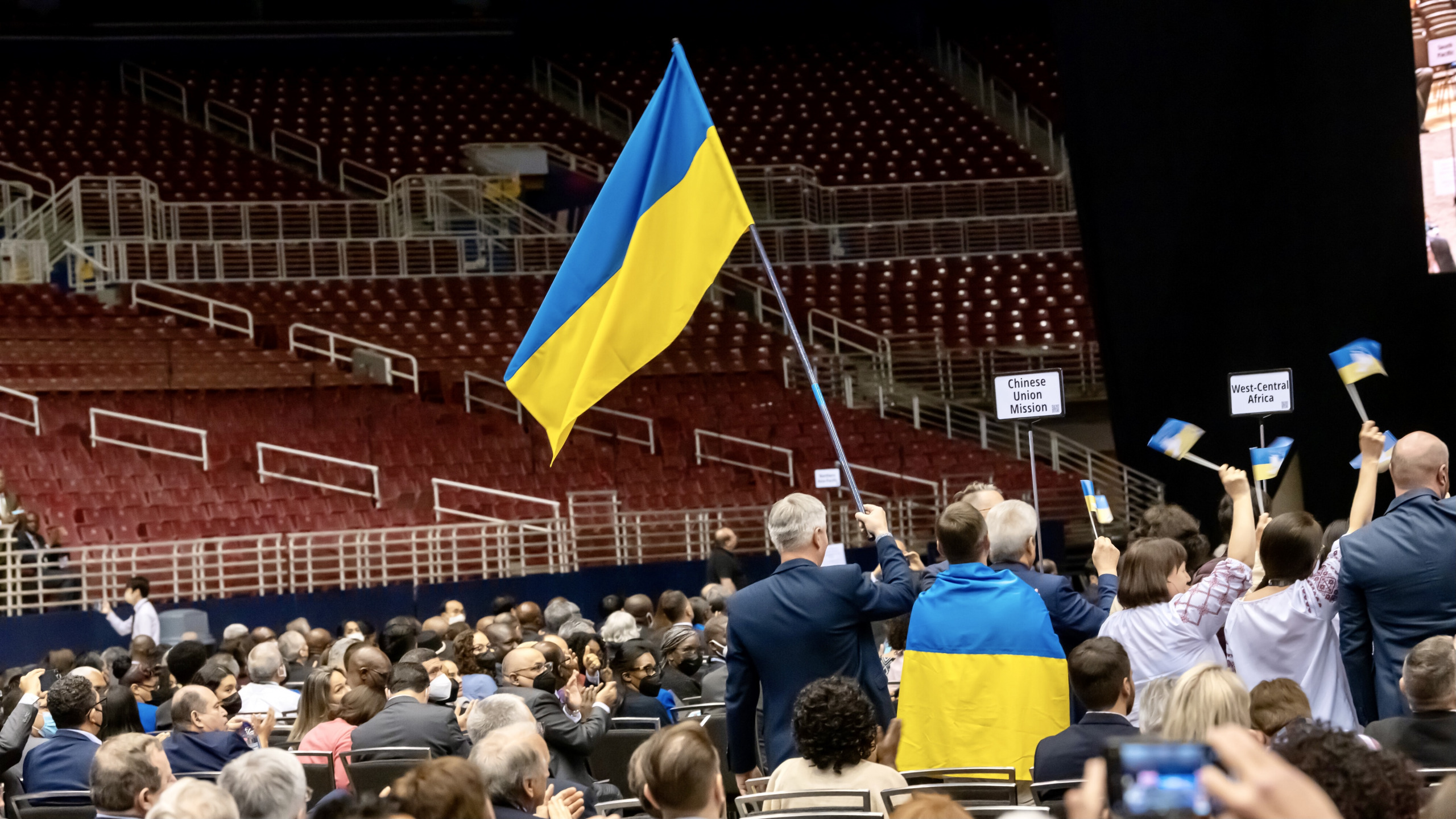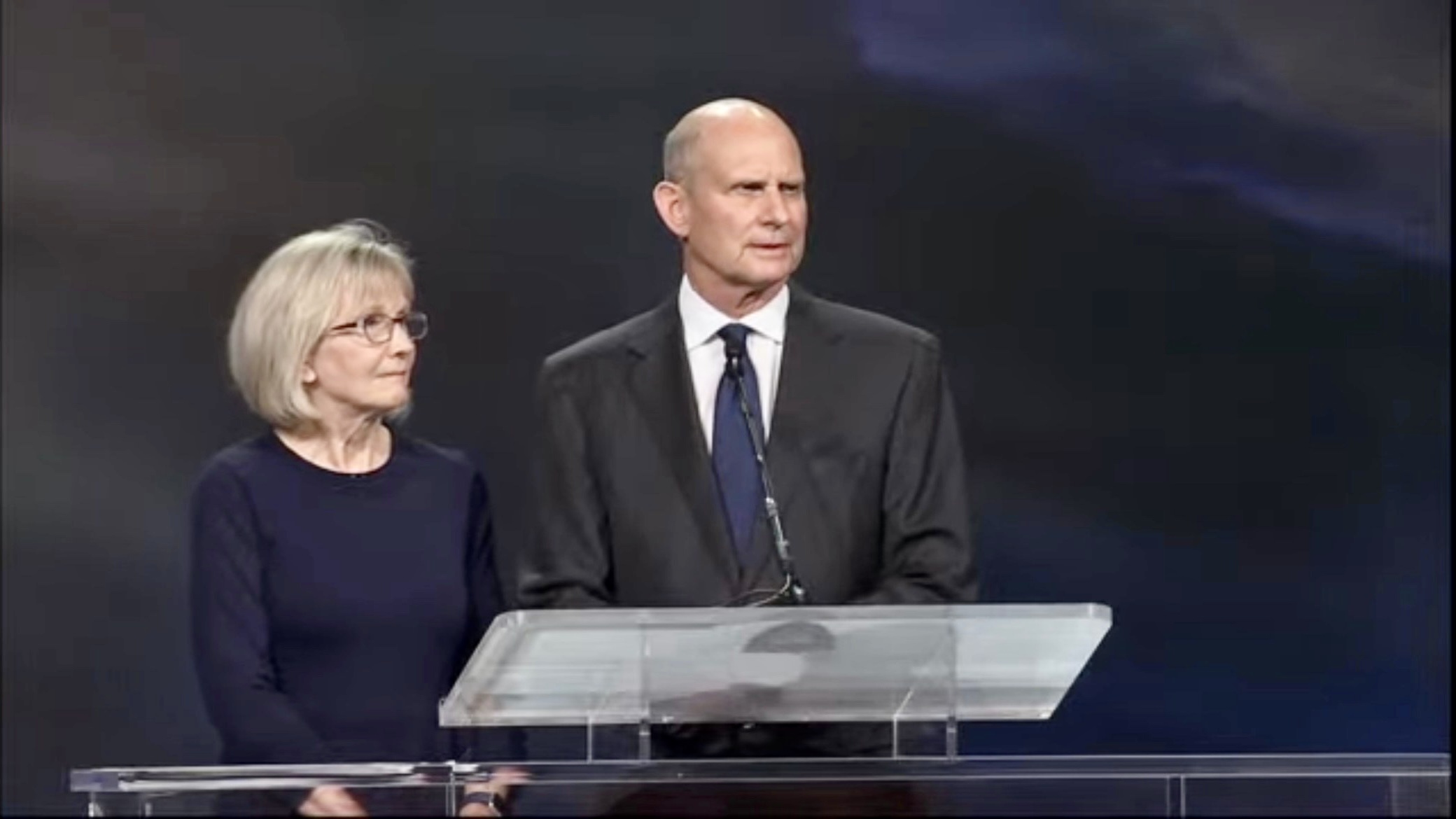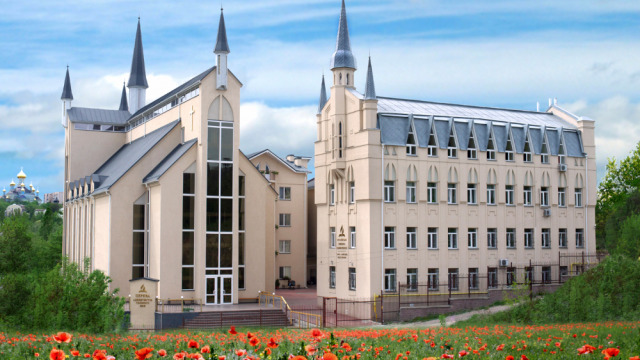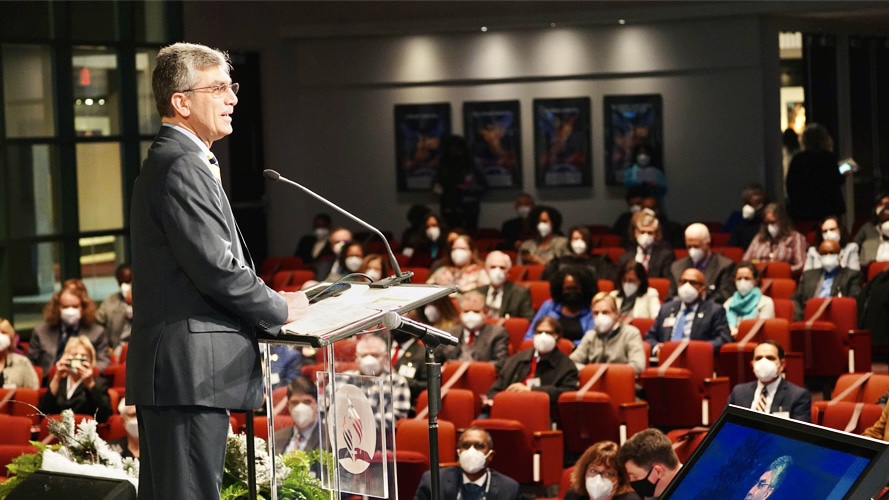Thursday, June 9th, 2022 marked the fourth day of the hybrid General Conference (GC) Session in St. Louis, Missouri. It was also the final day of scheduled business meetings. The day began with a digital concert featuring linguistically diverse musicians from around the globe. The business session followed with a warm welcome from Stephen Apola, associate director of the GC. Charissa Torossian, Prayer Ministries Director from the North New South Wales Conference, virtually shared a compelling message entitled “The Life and Ministry of Mary Magdalene,” reminding listeners that when we are devoted to Jesus, we live for Him, learn from Him, seek to listen to Him, and long to be in His presence. She reviews the life of Mary, noting how Jesus was worth everything to her. Torossian asked the question, “What is Jesus worth to you?” The morning worship came to a close with a time of prayer.
Morning Business Section
A point of order was raised by Tim Standish who shared concerns of the limited time allowed for delegates to complete the registration process to share their opinion during discussion time, as he was unable to share his opinion regarding Nominating Committee Report #9. For this reason, Standish requested that the report be sent back to the committee. His request was denied as it was already passed.The morning business meeting was chaired by General Vice-President of the GC Guillermo Biaggi. The following agenda items were addressed:
Church Manual Amendments – Church Offices and Departments
- Motion to delete section of “Ministry to People With Disabilities” in Chapter 8 from the Church Manual as a new section of Adventist Possibility Ministries has been added (item 420).
- 1155 voted yes (95.1%); 60 voted no (4.9%)
- Motion to amend chapter 8 of the Church Manual to allow the auditing of church membership records (item 428).
- This item was sent back to the committee as delegates expressed concerns with the word “auditing” for a previous item.
Church Manual Amendments – Discipline and Christian Living
- Motion to add a new chapter to the Church Manual in chapter 6 on making disciples (item 429).
- Several delegates expressed a desire to refer this item back to the committee for review requesting clarification on the definition of “discipleship” and translation challenges.
- Motion to cease debate and vote.
- 1332 voted yes (93.7%); 89 voted no (6.3%)
- Motion to amend chapter 10 of the Church Manual regarding making disciples to make this section consistent with the new mission statement of the World Church, voted by the 2018 Annual Council (item 430).
- Motion to cease debate and vote on previous motion.
- 1397 voted yes (96.2%); 55 voted no (3.8%)
- Motion to accept item 430.
- 1413 voted yes (95.9%); 61 voted no (4.1%)
- Motion to cease debate and vote on previous motion.
- Motion to amend chapter 7 in the Church Manual on “No Additional Tests of Fellowship” to simplify the language of this section (item 431).
- Due to delegate concerns with terms in the suggested amendments, many referred items back to the committee.
- Motion to amend chapter 7 of the Church Manual to clarify that written notice should be given prior to both the church board meeting and church business meeting before voting to discipline a member (item 432).
- Motion to cease debate and voting.
- 1396 voted yes (97.6%); 34 voted no (2.4%)
- Motion to accept item 432.
- 1364 voted yes (97.1%); 41 voted no (2.9%)
- Motion to cease debate and voting.
- Motion to amend chapter 12 of the Church Manual to add a direct quotation from the Bible regarding Sabbath-keeping (item 433).
- 1363 voted yes (94.6%); 78 voted no (5.4%)
- Motion to amend chapter 13 of the Church Manual to add a new section regarding premarital education and counseling to emphasize its importance (item 434).
- Motion to cease debate and voting.
- 1292 voted yes (95.1%); 62 voted no (4.9%)
- Motion to accept item 434.
- 1333 voted yes (98.3%); 23 voted no (1.7%)
- Motion to cease debate and voting.
- Motion to amend chapter 3 of the Church Manual on missionary purposes of organization to express the importance of finding new ways to reach the diverse cultures of the world with the Gospel, including the formation of new mission groups (item 435).
- Delegates motioned to reconsider item 435 by referring it back to the committee for review.
- Motion to cease debate.
- 1280 voted yes (98.7%); 17 voted no (1.3%).
- Motion to amend chapter 6 of the Church Manual allowing the church board to recommend the removal of a member from membership to a business meeting but without discussion, debate, or the need to vote (item 426).
- 1289 voted yes (99.2%); 11 voted no (0.8%).
AFTERNOON BUSINESS SESSION:
General Vice-President of the GC Geoffrey Mbwana chaired the afternoon’s business session, where the following agenda items were addressed:
Nominating Committee Vote for GC Corporation Board
The Nominating Committee presented the following votes for GC Corporation Board:
- Vote to approve Ted Wilson (chair), Daisy Orion, Timothy Aka, Guillermo Biaggi, Dennis Carlson, Scot Coppock, Paul Douglas, George Egwakhe, Erton Köhler, Thomas Lemon, Geoffrey Mbwana, Hensley Moorooven, J Raymond Wahlen II, Josue Pierre, James Winegardner, Saw Samuel, Audrey Andersson as GC Corporation Board.
- 525 voted yes (97.8%); 12 voted no (2.2%)
Three Angels Messages Project
A video presentation, hosted by Justin Kim, GC editor and assistant director of Sabbath School and Personal Ministries, recounted many individuals’ testimonies about how they encountered Jesus and now live to share the Gospel truth, the Three Angels’ Message, with others. It also shared several initiatives young people can become involved in to be part of this gospel sharing movement. We are the people who have been called to spread this message of hope before the end of time.
Resolution on the Holy Bible
Director of Biblical Research Institute Elias Brasil De Souza read the resolution of the Holy Bible found in the session agenda as item 124.
- Due to the need for clarification and risk of possibly misunderstanding some sections of the statement, several delegates expressed the desire for the statement to be referred to the committee.
- Motion to refer “Resolution on the Holy Bible” to the GC Administrative Committee.
- 650 voted yes (59.1%); 449 voted no (40.9).
- Motion to call the previous question (item 124) and cease discussion.
- 1101 voted yes (88.9%); 137 voted no (11.1%).
- Motion to reconsider the referral of the statement of the Holy Bible item 124.
- 815 voted yes (62.5%); 488 voted no (37.5%).
- Motion to cease all debate.
- 1166 voted yes (91.3%); 111 voted no (8.7%).
- Motion to refer item 124 to the committee.
- 427 voted yes (31.9%); 911 voted no (68.1%).
- Motion to call previous question and cease debate.
- 1234 voted yes (94.1%); 77 voted no (5.9%).
- Motion to approve item 124.
- 1249 voted yes (88.8%); 157 voted no (11.2%).
- Motion to refer “Resolution on the Holy Bible” to the GC Administrative Committee.
Statement of Confidence in the Writings of Ellen White
Associate Secretary of the GC Elbert Kuhn shared the GC Statement of Confidence in the Writings of Ellen White as found in the session agenda as item 125.
- Due to the need for clarity within this statement, a desire to refer the statement back to the committee was expressed by delegates.
- Motion to cease debate.
- 1052 voted yes (87.7%); 148 voted no (12.3%).
- Motion to refer item 125 to the committee.
- 507 voted yes (41.2%); 723 voted no (58.8%).
- Motion to table item 125.
- 642 voted yes (50.9%); 619 voted no (49.1%).
- Motion to remove from the table item 125.
- 1117 voted yes (82.0%); 246 voted no (18.0%).
- Motion to cease debate.
- 1224 voted yes (90.7%); 125 voted no (9.3%).
- Motion to approve item 125.
- 1189 voted yes (84.9%); 212 voted no (15.1%).
- Motion to cease debate.
Biblical Hermeneutics: An Adventist Approach
Frank Hasel, director of the Biblical Research Institute, shared information with attendees about the book entitled Biblical Hermeneutics: An Adventist Approach. He noted the importance and value of understanding Biblical Hermeneutics and added that it is a helpful resource to consider adding to your library! Learn more about it here.
Constitution and Bylaws and Church Manual Amendments
Undersecretary of the GC Hensley Moorooven shared an updated and revised agenda after committee review which was sent to delegates via email regarding items 206 and 208. He made the following motions:
- To remove the phrase “frontline denominational employee” for clarity and to add section 2 regarding minutes of the GC Executive committee (item 206).
- Motion to cease debate and call the previous question.
- 1155 voted yes (98.5%); 17 voted no (1.5%).
- Motion to amend item 206.
- 1166 voted yes (98.6%); 16 voted no (1.4%).
- Motion to cease debate and call the previous question.
- To amend item 208 allowing the GC Executive Committee to review and extend the postponement of GC Sessions and determine the timing for a subsequent session after a postponement.
- Motion to cease debate and call the previous question.
- 1066 voted yes (95.3%); 52 voted no (4.7%).
- Motion to amend item 208.
- 1054 voted yes (97.1%); 32 voted no (2.9%).
- Motion to cease debate and call the previous question.
*All items regarding the Constitution and Bylaw Amendments have been completed.
EVENING BUSINESS SESSION:
Due to a change in schedule, the evening session began with worship which included the deeply engaging message entitled “In the Beginning, There was Love.” Noemi Duran, director of the Geoscience Institute, recounted multiple examples of how animals’ capacity to be altruistic magnifies how the love of God is intended to be planted and demonstrated all throughout His creation. As a result, when we treat others poorly, we will never be able to reach their hearts. “Love, in contrast, can melt armors and turn walls into bridges,” she stated. This message was followed by a moment of prayer.
The meeting chair for the evening session was Thomas Lemon. The following motions agenda items were addressed:
Church Manual Amendments – Referred Items
Associate Secretary of the GC, Gerson Santos noted that all delegate comments regarding the referred items were taken back to the committee. As such, changes to the items were made and were again presented. He made the following motions:
- To amend chapter 10 of the Church Manual to add the term “should be” in the place of “typically are” and “chosen” rather than arranged (item 405).
- 899 voted yes (99.1%); 8 voted no (0.9).
- To amend chapter 9 of the Church Manual regarding when and how the Nominating Committee is to be appointed, procedure for filling vacancies in the case of a standing nominating committee, and appropriate representation within members of church nominating committee (item 412).
- 952 voted yes (98.6%); 14 voted no (1.4%)
- To amend chapter 8 of the Church Manual to allow for three-year terms of office in exceptional circumstances, if approved by the conference (item 413).
- 948 voted yes (98.9%); 11 voted no (1.1%).
- To amend chapter 8 of the Church Manual regarding several changes to the Youth Ministries section with the intent to clarify and simplify points including age changes for Adventurers (4-9) and Young Adults (22-30) (item 421).
- Motion to cease discussion and call the previous question.
- 958 voted yes (96.7%); 33 voted no (3.3%).
- Motion to amend item 421.
- 940 voted yes (93.6%); 64 voted no (6.4%).
- Motion to cease discussion and call the previous question.
- To amend chapter 10 of the Church Manual updating the list of church departments that should be represented in the local church board (item 422).
- 1029 voted yes (98.5%); 16 voted no (1.5%)
- To amend chapter 6 of the Church Manual to add a new section on Redemptive Membership review (item 427).
- 1013 voted yes (98.9%); 11 voted no (1.1%).
- To amend chapter 6 of the Church Manual to change the word “audit” to “review” to make it consistent with the rest of the document (item 428).
- 1052 voted yes (99.2%); 8 voted no (0.8%).
- To amend chapter 6 of the Church Manual by adding a section on discipleship (item 429).
- 1042 voted yes (98.5%); 16 voted no (1.5).
- To amend chapter 7 of the Church Manual to simplify the language of this section (item 431).
- 1047 voted yes (98.9%); 12 voted no (1.1%).
- To amend chapter 3 of the Church Manual to add a section regarding reaching the diverse cultural groups of our world (item 435).
- 1038 voted yes (99.1%); 9 voted no (0.9%).
- To amend chapter 8 of the Church Manual to include the use of electronic payments as a proper method of returning tithes and offerings (item 436).
- 1017 voted yes (99.2%); 8 voted no (0.8%).
- To amend chapter 1 of the Church Manual to allow for the principles in the manual to also be followed by a company without the need to repeat the word “company” throughout the manual (item 437).
- 1052 voted yes (99.4%); 6 voted no (0.6%).
*All Church Manual items have been reviewed and voted on.
The recorded livestream of today’s opening remarks, worship, and business meeting can be viewed on Youtube here. You can also access more information regarding GC Session, including the session agenda here. For information on the GC Session 2022 app, go to: https://adventist.news/news/2022-gc-sessions-first-official-app-goes-live.

